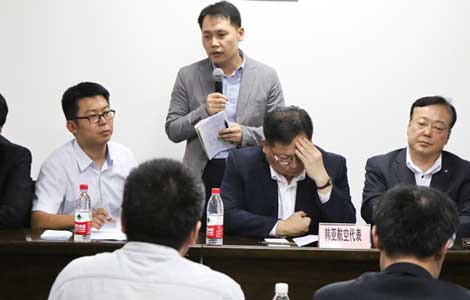Man helps uproot poverty in Guizhou village
Updated: 2013-07-19 16:42
By SU JIANGYUAN in Yina and WANG XIAODONG in Beijing (chinadaily.com.cn)
|
||||||||
When agrotechnician Li Bingbing found success growing traditional Chinese ginseng in Northwest China in the late 1990s, he never imagined he'd be able to repeat that prosperity in his impoverished hometown in Guizhou province.
"There was no road linking (cities) to the village before 2011 and villagers rarely left the village, except when they had to walk for more than 10 kilometers to a nearby town to sell their crops for salt," said Li during a regular checkup of his 15-hectare farm in Wuxing village last week.
Li, 42, earns 25,000 yuan ($4,075) a year in Wenxian county, Gansu province, growing ginseng. His hometown of Wuxing is thousands of kilometers away and until recently, he said it was not a good place for any type of business.
In the late 1990s, Li migrated to Gansu province with his wife and two children because of what he called Wuxing's "barren lands". He said the village at the time could barely sustain a family of four.
In Gansu, he worked at a construction site and earned little before turning to ginseng farming.
"I thought I would live in Gansu permanently," he said.
But when the Guizhou provincial government started a pilot program in 2011 to develop green industries and stem poverty in Yina county, which has jurisdiction over Wuxing village, Li was lured back.
Two years ago, one out of every four people in Guizhou, which at the time had a population of 40 million, lived below the national poverty line, making it one of the most impoverished regions in China.
Li said that when he heard the Yina government was offering assistance to farmers, he wanted "to have a try". He returned to Wuxing carrying ginseng seeds and began planting them as an experiment to see if the soil was suitable.
It turns out the barren land was ideal for the crop. In fact, he said the ginseng grew much better in his hometown than in Gansu province.
"I can only make 7,500 yuan from growing a hectare of corn, but net income from a hectare of ginseng can reach 100,000 yuan," he said.
To encourage ginseng farms, Guizhou's provincial poverty relief department allocated more than 3.5 million yuan in assistance. For every 3 hectares of ginseng farmers grow, the local government will subsidize the cost of another hectare.
Taking advantage of the policy and using his experience in ginseng farming, Li established a cooperative community to plant ginseng. The community has thus far planted ginseng across 370 hectares of farmland and incorporates 1,047 rural households.
"All the ginseng will be primarily processed before being sent to big cities such as Guangzhou for deep processing," he said. "Some is exported to other countries in Asia."
Agriculture is now thriving in Wuxing and more cooperatives have been established to grow other agricultural products, such as tobacco. Farmers in the village are also becoming more adept at breeding livestock
"Such a thriving farming business would have been unimaginable three years ago when villagers toiled on their own land or migrated for work," Li said.
By the end of last year, the Yina government received more than 600 million yuan to fight poverty. That money has been used across 306 programs, covering infrastructure, local industries and environmental protection.
Last year, per capita GDP in Yina was 9,490 yuan, an increase of 158.58 percent from 2010.
Ecological protection remains a priority to prevent the developing agriculture from harming the environment, said Yang Xingyou, Party chief of Weining county, which governs Yina.
But "we still have blue skies and green landscapes," he said.
Chen Jie, a Wuxing farmer, said local farmers choose crops that do not disrupt the area's ecology.
"Last year, we rejected an offer from a medicine company to collect a kind of herb on mountains," he said. "The plant is the major vegetation of the mountains and removing it could make the mountains fragile."
Since 2011, Yina has spent more than 30 million yuan in ecology, including protecting forests, transforming farmland to forests and battling desertification, said Mu Chunlin, Yina's Party chief.
Forest land has increased from 26 percent in 2010 to 38.2 percent last year, he said.
"Ecological protection should be integrated into economic, political, cultural and social development for a sustainable development," said Zhao Kezhi, Party chief of Guizhou province.

 Firefighters hold line against California wildfire
Firefighters hold line against California wildfire
 Rat, rabbit head sculptures on display
Rat, rabbit head sculptures on display
 Detroit files biggest ever US municipal bankruptcy
Detroit files biggest ever US municipal bankruptcy
 Russia jails opposition leader
Russia jails opposition leader
 Plane crash victims' parents seek answers
Plane crash victims' parents seek answers
 'Improving' Mandela marks 95th birthday
'Improving' Mandela marks 95th birthday
 Qingdao eatery finds use for pesky seaweed
Qingdao eatery finds use for pesky seaweed
 From university campus to boot camp
From university campus to boot camp
Most Viewed
Editor's Picks

|

|

|

|

|

|
Today's Top News
Detroit faces uncertain future in bankruptcy
Apple, Google urge surveillance disclosure
Monetary system needs overhaul, says report
US companies seek tougher enforcement of IP laws
Syrian refugees demand help from Kerry at camp
Second iPhone shock leaves man in coma
China's government spends less in 2012
Pregnant Olympic runner dies, baby saved
US Weekly

|

|






